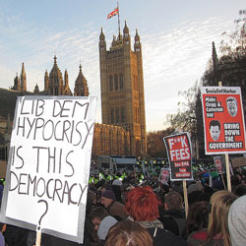Social action motivated by anger towards government, such as the recent student demonstrations against tuition fees, should be part of the Big Society debate, says the Third Sector Research Centre in a new report on ‘below the radar’ examples of community groups.
The report says policies on community engagement, such as the Big Society agenda, too often ignore situations when government has been extremely successful in galvanising community action by angering people, such as anti-Iraq war demonstrations or the establishment of the Countryside Alliance.
“If community groups are to be involved in delivering the Big Society,” says the report. “Policies to engage people in community action need to be informed by a more sophisticated understanding of how and why community organisations operate."
It continues: “People primarily take part in community action for very personal reasons rather than from a sense of civic duty, and the research questions whether this can be co-opted to delivery particular policy objectives.”
The report also estimates that 600,000 or more small community groups have the ability to play a role in delivering the Big Society.
However these groups are often ‘below the radar’ because they are either not registered with the Charity Commission, do not appear in official directories or lack a regular, substantial annual income.
Angus McCabe, a Third Sector Research Centre researcher said: “Looking at the range and diversity of ‘below the radar’ activity, it can be argued that we already have a Big Society. The question is whether government can engage with this activity to meet ambitious agendas that include empowered and active citizens, devolved local decision making, a restoration of public trust in politics, flexible and cost effective services.”









